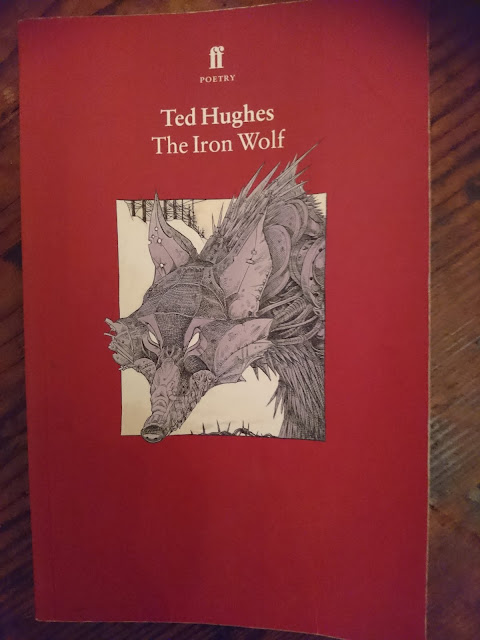School pick up is the high point of my day. It is a bit over a mile to walk with my children back from school. A little warm hand holds mine while on the other side my nine year old's skinny arms sometimes snake round my waist as his legs walk obligingly in synch with mine. Unsurprisingly in this connected contortion we are, if practised, not fast and we cover a lot of chat in that time. Unaware that today is National Poetry Day yesterday I had brought Ted Hughes’ The Iron Wolf to read together.
I find reading distracts my younger son from objections about walking and having insufficient (or insufficiently unhealthy) after-school snacks. I laughed yesterday when the leader of our singing group, a mother of three boys told how when her children come in from school, the first thing they say is not "Hi mum!" or "How are you?" but "What can I have?". A woman I didn't know well recently confessed her children run out of school, hang their school bags upon her, burrow about for a snack and disappear to play for a while. Again my laughter was of recognition. We agreed that if you strip away the veneers that separate parents waiting in the school playground there might not be so much difference in our experiences.
The Iron Wolf is a collection of animal poems which are refreshingly unpatronising towards children.
Years ago, long before it was probably 'age appropriate' they knew the seasonal Who Killed The Leaves by heart because it was on this cd which we played in the car. Now they are humming the choruses to the Osiligi Masai warriors' songs who tour Britain annually, often in church halls and schools. We loved it, found it affecting and would go again.
This is another good poetry cd for children, especially Browning’s superb The Pied Piper of Hamelin. Its strength is its great variety. My seven year old prefers Framed in a First-Story Winder (Anonymous) for which he swaps his Scottish accent for an uncannily imitative London one, to tell the gruesome story with disconcerting relish. Hilaire Belloc, aware of chidlrens delight in sticky endings, was onto something.
Today they chose which poem they wanted me to read from Chris Riddel’s evocative illustrations. I am unsurprised to discover he is the current Children’s Laureate. One poem Cat reminded me of “cat-dancers” from the last post in the other place. Another Hughes poem about planting, trees in particular, is the dark My Own True Family. If it is a mistake to write about music, it is even more so true about poetry. Poems are the subtlest form of writing. Like literary cats they evade being pinned down by trite, pedestrian interpretation. Poems belong to themselves.
I chose Cat to share here is because I agree it is wearing to be in artificial places, to be told and controlled and to have individuality eliminated and standardised. We go to town (or dance class) of our own choosing thinking we are doing ourselves good yet it tires us out. They are not natural places. It is those who are their own selves and who are in harmony with what is around them who have a kind of transmittable, energising, restorative power. Why is it so hard sometimes, for us to see the difference?



No comments:
Post a Comment